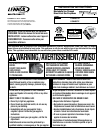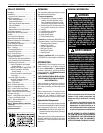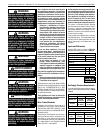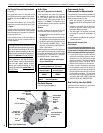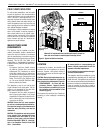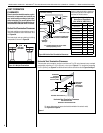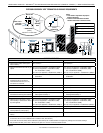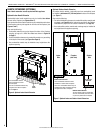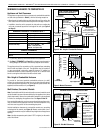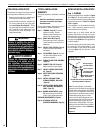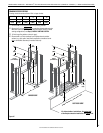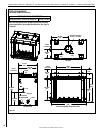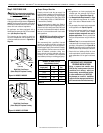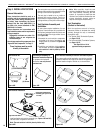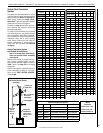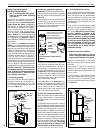
4
Requirements for the
Commonwealth of Massachusetts
These fireplaces are approved for installation in
the US state of Massachusetts if the following
additional requirements are met:
• Install this appliance in accordance with
Massachusetts Rules and Regulations 248
C.M.R.
• Installation and repair must be done by a
plumber or gas tter licensed in the Com-
monwealth of Massachusetts.
• The exible gas line connector used shall
not exceed 36 inches (92 centimeters) in
length.
• The individual manual shut-off must be a
T-handle type valve.
Massachusetts Horizontal Vent
Requirements
In the Commonwealth of Massachusetts, hori-
zontal terminations installed less than seven
(7) feet above the finished grade must comply
with the following additional requirements:
• A hard-wired carbon monoxide detector
with an alarm and battery back-up must be
installed on the floor level where the gas
replace is installed. The carbon monoxide
detector must comply with NFPA 720, be
ANSI/UL 2034 listed and be ISA certied.
• A metal or plastic identication plate must
be permanently mounted to the exterior of
the building at a minimum height of eight (8)
feet above grade and be directly in line with
the horizontal termination. The sign must
read, in print size no less than one-half (1/2)
inch in size, GAS VENT DIRECTLY BELOW.
KEEP CLEAR OF ALL OBSTRUCTIONS.
New York City, New York (MEA)
Installation of these fireplaces is approved for
installation in New York City, NY.
Orange Wire
(from DFC Wire
Harness)
Pressure
Regulator
Tower
Yellow Ground Wire
(From DFC Wire
Harness)
Green Wire
(From DFC Wire
Harness)
Line (In) Test Port
Manifold (Out)
Test Port
Connect GTMS
Wire Harness
Outlet
3/8" NPT
Inlet
3/8" NPT
NOTE: DIAGRAMS & ILLUSTRATIONS ARE NOT TO SCALE.
Figure 1: SIT Proflame Valve
LENNOX HEARTH PRODUCTS • MONTEBELLO
®
SEE-THROUGH DIRECT-VENT GAS FIREPLACES (LSM40ST-N / LSM40ST-P) • INSTALLATION INSTRUCTIONS
These appliances must be isolated from
the gas supply piping system (by closing
their individual manual shut-off valve)
during any pressure testing of the gas
supply piping system at test pressures
equal to or less than 1/2 psig (3.5 kPa).
These appliances and their individual
shut-off valves must be disconnected
from the gas supply piping system
during any pressure testing of that
system at pressures greater than 1/2
psig (3.5 kPa).
Burner Orifice Sizes
Elevation 0–4500 feet (0–1372 meters)
Natural Gas
Drill size (inches)
Propane
Drill size (inches)
#32 (0.116")*
H8002•
#52 (0.0635")*
H8003•
Table 4
*
Standard size installed at factory.
•Part/CatalogNumber.
Gas Valve Diagram
See valve diagram in Figure 1.
Orifice Sizes
Sea Level To High Altitude (All Models)
These appliances are tested and approved
for installation at elevations of 0–4500 feet
(0–1372 meters) above sea level using the
standard burner orice sizes (marked with an
asterisk [*] in Table 4). For elevations above
4500 feet, contact your gas supplier or qualied
service technician.
Deration
At higher elevations, the amount of BTU fuel
value delivered must be reduced by either:
• using gas that has been derated by the gas
company; or
• changing the burner orice to a smaller size
as regulated by the local authorities having
jurisdiction and by the (USA) National Fuel
Gas Code NFPA 54/ANSI Z223.1 - latest
edition or, in Canada, the CAN/CSA-B149.1
codes - latest edition.
Install the appliance according to the regulations
of the local authorities having jurisdiction and,
in the USA, the National Fuel Gas Code NFPA
54 / ANSI Z223.1 - latest edition or , in Canada,
the CAN/CSA-B149.1- latest edition.
NOTE: Flame appearance will diminish
4% per thousand feet.
Gas Supply Pressure Requirements
(continued)
Test gauge connections are provided on the
front of the electronic gas control valve (identi-
fied IN for the inlet and OUT for the manifold
side).
The control valves have a 3/8" (10 mm) NPT
thread inlet and outlet side of the valve. Refer
to Figure 1.
Propane tanks are at pressures that will cause
damage to valve components. Verify that the
tanks have step-down regulators to reduce the
pressure to safe levels.
These appliances must not be connected to a
chimney or flue serving a separate solid fuel
burning appliance.



